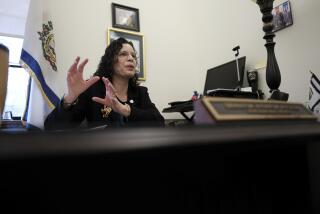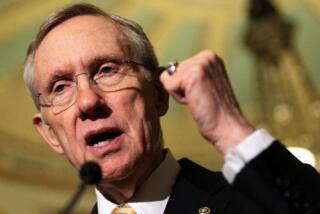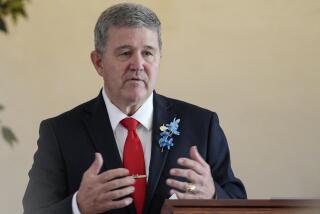Race, Abortion Are Key Issues in Va. Contest : Election: Wilder seeks to be the first elected black governor. A mainstream candidate, he tells Jesse Jackson to stay home.
- Share via
DANVILLE, Va. — In autumn twilight on a nearby tobacco farm, a new day in Southern politics appeared to be dawning amid steaming pots of Brunswick stew.
Three hundred well-dressed Virginians were mixing easily at a rally for Lt. Gov. L. Douglas Wilder, the grandson of slaves who is seeking to become the nation’s first elected black governor.
And in this bastion of the Confederacy, about half of Wilder’s supporters were white--including politicians once identified with the old Harry F. Byrd machine, which promoted “massive resistance” to court-ordered desegregation in the 1950s and ‘60s.
“I’m in shock,” city Democratic Chairman Sarah Furgurson said with a hearty laugh as Wilder made the rounds of people downing the locally traditional stew of chicken, wild game and vegetables. “To have such a large turnout of white voters really looks good for us.”
With Tuesday’s election approaching, a Washington Post poll on Saturday gave Wilder an 11-point lead over his Republican opponent, former state Attorney General J. Marshall Coleman, although other surveys have shown the race much closer.
Wilder’s race is not the only focus of his contest with Coleman. Their battle is also being watched nationally for its emphasis on the intensifying abortion issue.
Wilder has netted crucial support by attacking Coleman’s anti-abortion stance. If the U.S. Supreme Court had not enhanced the states’ ability to restrict abortion, a Coleman aide asserted, “we’d be blowing Wilder away.”
Nevertheless, political analysts believe that a Wilder victory could inspire a number of other potential black candidates to run--for example, former Charlotte Mayor Harvey Gantt, a Democrat who is considering a 1990 bid against Sen. Jesse Helms (R-N.C.).
“What happens in Virginia could say that things can happen anywhere,” Wilder declared in an interview as he shook the hands of workers at a textile mill here.
Analysts note that Wilder and New York mayoral candidate David N. Dinkins are among an increasing number of black candidates seeking to broaden their support by placing themselves in the political mainstream.
“We are certainly seeing a different kind of appeal,” said Linda Williams, a scholar in black political trends who is teaching at Harvard on leave from her job as research director of Washington’s Joint Center for Political Studies. “We don’t hear the sort of rhetoric of ‘Our time has come.’ Instead, we hear black candidates emphasizing their resumes and emphasizing they are the people to bring about unity.”
In a striking illustration of this strategy, Wilder asked the Rev. Jesse Jackson, the most prominent black in national politics, to stay out of his campaign for governor.
“I think Jesse is an activist,” Wilder told the Associated Press. “I have been involved with compromises--getting half the loaf when you couldn’t get the whole loaf. I don’t want to walk away empty-handed.”
Coleman gently injected the race issue into the campaign on Thursday when he told reporters that they were applying a “double standard” to Wilder and granting him “lenient treatment” because he is black.
Wilder’s campaign retorted that Coleman’s remarks were “offensive.”
Earlier, in an interview with The Times, Coleman said: “The test of maturity in Virginia is whether our state can accept or reject someone irrespective of their race.” He urged voters “to look at a candidate on the basis of his merit.”
Race aside, neither candidate has been immune from the nationwide epidemic of negative political advertising. Wilder has slammed Coleman on abortion and his ties to land developers, and Coleman has accused Wilder of taking legislative stands against rape victims and battered spouses.
Coleman also has aimed barbs at Wilder’s character, pointing out that he was reprimanded by the state Supreme Court for negligence as a lawyer, owned a row house that was the subject of housing code violations and failed to list all of his holdings on financial disclosure forms.
When Coleman has not been attacking Wilder, he has campaigned on a platform of fiscal responsibility and improvements in the state’s transportation system, particularly in the Washington suburbs. And in a back-handed slap at the current Democratic Administration, the 47-year-old Coleman has vowed to appoint high-caliber people of strict integrity to top state jobs.
Meanwhile, the 58-year-old Wilder is barely remembered anymore as the Afro-haired liberal who entered the Virginia Senate 19 years ago demanding repeal of the state song, “Carry Me Back to Old Virginny,” because of the words, “that’s where this old darkie’s heart am longed to go.” He protested, to no avail, that the phrase meant that “the old slave wants to go to heaven and join the old master to live in perpetual slavery.”
Instead, Wilder, who represented a predominantly black Richmond area where he grew up as the son of an insurance salesman and a homemaker, shifted to the right and became one of the state Senate’s most pragmatic and prominent leaders. Along the way, he grew wealthy practicing law and investing in Richmond real estate.
Wilder learned to make compromises to achieve his goals. He spearheaded the successful campaign to make Dr. Martin Luther King Jr.’s birthday a state holiday, agreeing to add Virginia Civil War heroes Robert E. Lee and Stonewall Jackson to the list of men who would be honored on the third Monday of January.
Four years ago, he won election as lieutenant governor largely by taking his courtly charm on a station wagon tour of every county in Virginia.
“While he is an uncanny politician and very smart, when you meet him you don’t feel like he’s hustling you,” said State Sen. Moody E. (Sonny) Stallings Jr., a Virginia Beach Democrat. “Some of the fear is gone from the good old boys when Doug sits down and talks with them eye to eye. They say he’s just like us.”
Wilder also received key endorsements in 1985, including one delivered by a beefy, white rural cop in a celebrated television ad. Other support came from two popular Democratic moderates: outgoing Gov. Charles S. Robb (now a U.S. senator) and his successor, Gerald L. Baliles.
Now Wilder is a close-cropped, elegantly attired millionaire who drives a Mercedes, and he is hailing the state’s economic prosperity and vowing to continue the “fiscal conservative management” of Robb and Baliles.
“Those persons involved in our progressive prosperity are supporting my candidacy,” he told the rally near here, referring in part to heavy business backing of his $6-million campaign. “Sometimes those persons are described as being in a new Virginia mainstream.”
Two-thirds of the sheriffs and chief county prosecutors are supporting Wilder, a critical factor in rural areas where the courthouse crowd wields daunting patronage power and political influence.
“With the advent of Robb and Baliles, it’s been very fashionable to get back into the Democratic Party. With Wilder, I think they’re still coming back,” said Danville bail bondsman John O. Sizemore in a reference to the massive defection of Democratic voters in the 1970s and ‘80s because of liberal presidential nominees.
Wilder has broad appeal because “he doesn’t raise a lot of the old-time fears that a lot of whites have about black politicians,” Sen. Stallings said. “He has tailored his message to put those fears at ease. To get elected in Virginia, he knows he’s got to play a conservative song. So he’s gotten very much more law-and-order conscious. If policemen think he’s OK, he’s seen as more of a conservative good old boy than a wild-eyed liberal.”
Wilder himself said that he has overcome the racial barrier by “ignoring it. . . . You just work with people and work to issues, and I’ve always worked to issues, whether it’s housing or education or transportation. I have found that those things (racial matters) pale when it comes to making a determination on the issues.”
He surmised that he enjoys at least one advantage not shared by Los Angeles Mayor Tom Bradley, a black who narrowly failed to win the California governorship in 1982 and then lost big in a 1986 rematch with George Deukmejian.
“He didn’t have eight good years of people being there ahead of him like I do,” Wilder said. “I’m really running on an incumbency platform. The entry level (for blacks) is very important. It would have been difficult for me to run for governor starting straight off the ground.”
For Buster Ross, a black worker at the Dan River Mill here, the elevation of Wilder to the governor’s chair would be “a great thing to be proud of.” But Ross said: “I don’t think Wilder is interested in race. He’s for everybody.”
Ross looks forward to the day that Wilder might step across the Potomac River and take over the White House: “He’d probably have a better chance than Jesse Jackson.”
Darlene Walker, a white worker at the mill, said she too would vote for Wilder. “This day and time, I don’t think you look at people and say they’re black or they’re white,” she said. “I think it just has to be the most qualified.”
But polls indicate that latent racism may be a factor in this state, where 18% of the voting-age population is black.
Ralph Johnson of Wytheville, in a letter to the Roanoke Times and World-News, expressed the belief that all blacks would vote for Wilder, and so “all the white voters should vote for Marshall Coleman solely because he is white.”
Mary Pinkerton of Highland Springs, a longtime Virginia resident, acknowledged that racial feelings are deeply ingrained. “It’s something that nobody will discuss, but you know the feeling is there,” said Pinkerton, who is white. “Yes, it can influence your vote. It isn’t right, but you’re just reared with that belief.”
Claude Whitehead, a white dentist and former chairman of the Pittsylvania County Board of Supervisors here, said that “Doug would probably win hands down outside of the fact he is black. But I think most people are over that type of thing.”
Evidence of that was rampant at the Brunswick stew rally. Among old-line white Democrats on hand was former state Delegate Claude Swanson, who warmly introduced Wilder as “an extremely nice person, always friendly, always helpful. He has a good sense of humor, and we worked very closely” in the Legislature.
Wilder makes only an occasional reference to the historic nature of his potential feat, combining it with an oblique attack on Coleman’s abortion views.
“Virginians don’t like to turn the clock back . . . that’s a Rubicon that’s been crossed,” said Wilder, alluding both to his election as lieutenant governor in 1985 and to the Supreme Court decision legalizing abortion in 1973.
Wilder’s stunning victory for lieutenant governor four years ago was chronicled in a book entitled, “When Hell Froze Over.” Asked what the next book might be called if he were elected governor, Wilder laughed and said that his press secretary, Laura Dillard, had it all figured out: “When Hell Broke Loose.”
More to Read
Get the L.A. Times Politics newsletter
Deeply reported insights into legislation, politics and policy from Sacramento, Washington and beyond. In your inbox twice per week.
You may occasionally receive promotional content from the Los Angeles Times.










